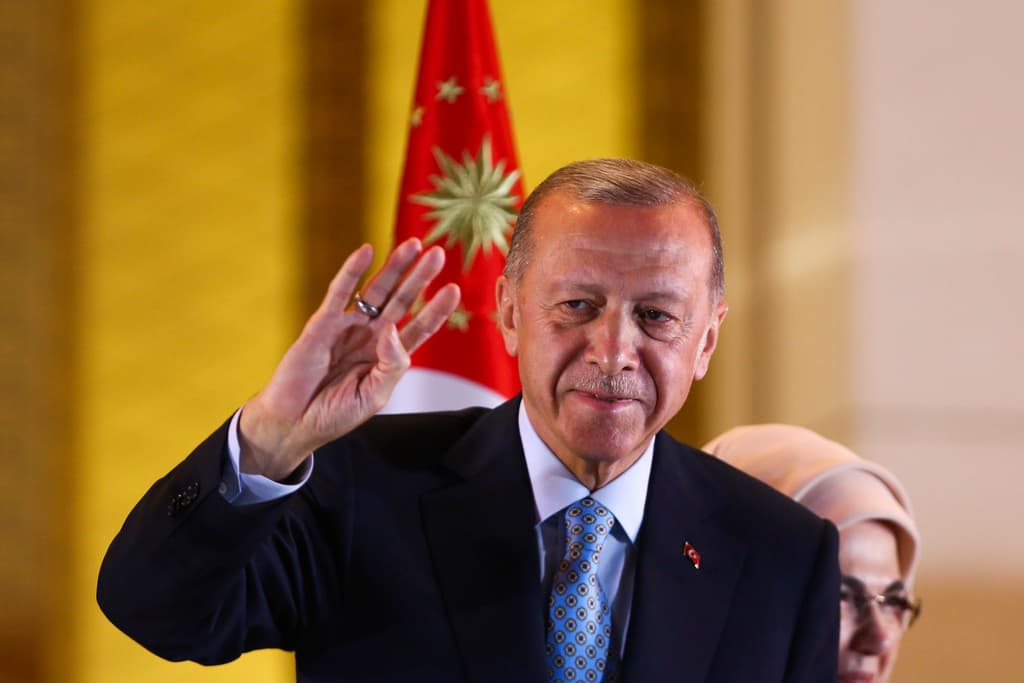Greece Greets Erdogan’s Big Win With a Phone Call and a Shrug
A savvy politician, the president of Turkey is aware that this period is delicate for Kyriakos Mitsotakis as Greece readies for a second election.

ATHENS — Kyriakos Mitsotakis, until last week the prime minister of Greece, will phone President Erdogan today to congratulate the Turkish president on his re-election, but otherwise Greeks are mostly greeting the reality of a third term for the testy Turk with a collective shrug.
That is only partly because Mr. Erdogan’s victory is what everyone in Greece expected. It is also because Greece is in the middle of an unusual election cycle of its own, with a caretaker government now in place until Greeks go to the polls again on June 25.
The complex machinery of modern Greek politics is now on full display as the new parliament sworn in on Sunday will be dissolved by presidential decree on Monday or Tuesday. That is because, earlier this month, even though the New Democracy party headed by Mr. Mitsotakis trounced the main left-wing opposition party, Syriza, by a margin of two to one, it fell short of securing enough votes for a parliamentary majority.
A caretaker prime minister, Ioannis Sarmas, is in charge until the second round of voting, but as if to underscore how his position is merely provisional, it is Mr. Mitsotakis who will speak to Mr. Erdogan. Expect that conversation to be a brief one.
Although it is a given that Mr. Mitsotakis will resume his position following the second round, an overall majority for New Democracy cannot be taken for granted. In the next few weeks the complicated gears of parliamentary jockeying risk overheating.
A savvy politician, Mr. Erdogan is aware that this period is quite delicate for Mr. Mitsotakis, also a seasoned leader and one with whom Mr. Erdogan has in the past said we would refuse to speak. Mr. Mitsotakis told the Greek television station Mega that “as long as the Greek people trust me again, I will seek a meeting with Erdogan.”
Greece and Turkey are like two fractious brothers joined at the hip. Their shared history, common border, and membership in NATO make their relationship different from those between Ankara and other European countries or, for that matter, America.
They may not love it, but Greece and Turkey are essentially roommates and the Mediterranean is their bunk.
According to the American Department of State, “Türkiye is an important U.S. security partner and has been a valued NATO ally since 1952. Türkiye serves as NATO’s vital eastern anchor on the straits of the Bosporus and the Dardanelles, which link the Black Sea with the Mediterranean.”
Washington will ostensibly prime the radar for how far Mr. Erdogan veers from Ataturk’s secular legacy and which way the strongman will tilt with respect to hot-button issues like Turkish relations with Syria’s improbably rehabilitated Bashar al-Assad and Mr. Erdogan’s cozying up to Vladimir Putin.
But the view from Athens? By force of proximity, it will have to be more pragmatic. A steady consolidation of Turkish nationalism in the years ahead is almost a given, but how that overarching trend plays out day to day is anybody’s guess. For some clues, one need only look at the calendar.
For Washington, the dates July 11 and July 12 could be significant. That is when the next NATO summit takes place, at Vilnius. Mr. Erdogan is expected to attend and if he does, will he drop his opposition to Sweden’s joining the military alliance by then?
Mid-July will mark the passing of seven years since the failed coup of 2016 in which a faction of the Turkish army tried to overthrow Mr. Erdogan. Will the 69-year-old president, fresh off the heels of his electoral victory, greet that anniversary with a nostalgic grin or a snarl? And just how bad will Turkey’s inflationary picture be by summer’s end?
Before the end of the summer, when like Greece next door Turkey hopes to have generated tens of billions of dollars from the all-important tourism industry, a more significant anniversary is coming up, particularly for Athens. July 24 marks the hundredth anniversary of the signing of the Treaty of Lausanne.
No fusty bit of parchment, the Treaty of Lausanne relinquished Ottoman Empire territorial claims including, significantly, all claims to Cyprus and the Dodecanese islands. The thorny issue of Cyprus — which Turkey invaded in 1974 — notwithstanding, in recent years Mr. Erdogan has aggressively maintained that Greek islands in the eastern Aegean need to be totally demilitarized. He has even threatened to “come by night” to achieve that goal.
The risk of a hot incident in the Aegean Sea that brings two important NATO members to the brink of war has happened before, and cannot be ruled out.
Some of Mr. Erdogan’s bellicose rhetoric toward Greece can be seen as a message of some resentment toward Washington over its investing heavily in military bases on the Greek mainland. But it is Greece that bears the brunt of Turkey’s bile. Will there be more?
In the short run, probably not. Following some much appreciated Greek assistance for Turkey after a devastating earthquake last February — after which some Turkish newspapers even ran headlines in Greek to thank Athens for its support — Greco-Turkish relations improved almost overnight. In terms of those lingering maritime territorial disputes, the Mediterranean became almost pacific.
Those tranquil currents will likely persist for a couple of months, but after all the election fanfare fizzles out there is no guarantee of calm after that.

